|
Winter is here and in full swing! Thanks to weather changes, nutritional needs change from season to season. In the winter, we are constantly switching from cold outdoor temperatures to dry, heated indoor environments, increasing the risk of infection. One of the best ways to sustain a robust, healthy immune system this winter is by maintaining a balanced diet rich in various nutrients and incorporating daily movement. Sticking to a balanced diet won’t prevent you from getting sick necessarily, but a well-supported immune system can help better protect you. So, the question is, what foods will support our immune system and overall health this winter? Here are a few tips to keep in mind during these colder months of the year! 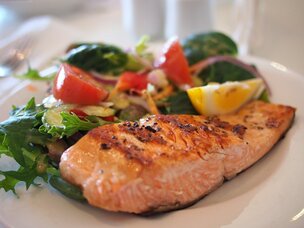
Vitamin D deficiency is quite common and is associated with:
Food Sources of Vitamin D:
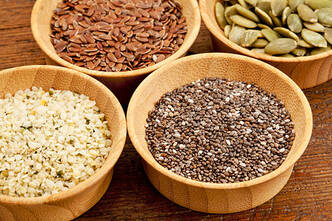
Some examples include:
There are several foods rich in Omega-3 fatty acids like:
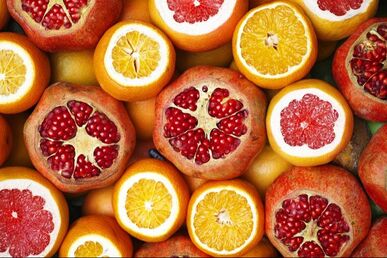
Here are two delicious recipes that are packed with nutrients and perfect for the wintertime ~ 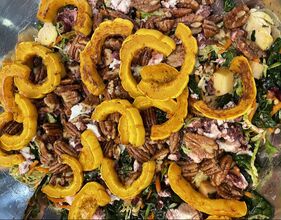 Ultimate Winter Salad Yield: 8 entrée servings or 16 side servings Ingredients: 6 oz. weight shredded kale ½ small lemon, juiced 1 Tbsp. extra virgin olive oil 6 oz. weight shredded vegetables (Brussel sprouts, cabbage, carrots) 2 medium apples, cored & diced 1 ½ cups candied pecans (see note) 4 oz. weight crumbled goat cheese 1 ½ cups roasted delicata squash (see note) ½ cup pomegranate arils For the Dressing: ½ cup red wine vinegar 4 tsp. whole-grain or Dijon mustard 4 tsp. pure maple syrup ¼ tsp. sea salt ¼ tsp. ground black pepper ½ cup extra virgin olive oil Instructions: 1. Put the shredded kale in a large salad bowl. Add lemon juice and extra virgin olive oil. Use your hands to massage the lemon juice and olive oil into the greens - about a minute or so. The kale should wilt slightly and deepen in color. 2. Add the other shredded vegetables/greens, chopped apple & candied pecans to the bowl. 3. Make the dressing by combining all of the dressing ingredients in a lidded glass jar or canning jar. Shake vigorously for 30 seconds. Pour the dressing over the salad & mix well. 4. Add the crumbled goat cheese, delicata squash, and pomegranate arils to the top. Serve & enjoy! Nutrition per serving: 330 calories; 27g Fat; 11g Protein; 17g Carbohydrates, 250mg Sodium, 375mg Potassium 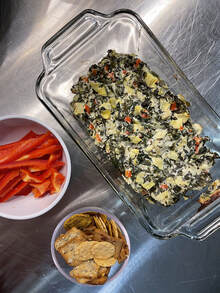 Hot Spinach Dip Yield: 3 cups (24, 2 Tbsp. servings) Ingredients: 1 (10 ounce) package frozen chopped spinach, thawed & drained well ½ cup red bell pepper, diced 2 Tbsp. minced garlic ½ lemon, juiced 1 (6.5 ounce) jar artichoke hearts, drained & mashed ½ cup light cream cheese ¼ cup nonfat Greek yogurt ½ cup grated Parmesan or Mozzarella cheese Ground black pepper, to taste ¼ tsp. crushed red pepper (optional) Instructions: 1. Preheat oven to 350 degrees F (175 degrees C). 2. Mix together spinach, bell pepper, garlic, lemon juice, artichokes, cream cheese, Greek yogurt, and cheese. Season with pepper to taste. Spoon mixture into a 1-quart baking dish. Top with crushed red pepper if desired. 3. Bake for 20 minutes, or until bubbly. Enjoy with whole-grain crackers, tortilla chips, bread, or your favorite vegetables. Nutrition per 2 Tbsp. serving: 37 calories; 2g Fat; 2.7g Protein; 2.3g Carbohydrates, 82mg Sodium, 62mg Potassium Stay healthy & warm this winter!
-Maheen Jamshidpour, Dietetic Intern Resources: https://my.clevelandclinic.org/health/articles/17290-omega-3-fatty-acids https://www.eatright.org/food/vitamins-and-supplements/types-of-vitamins-and-nutrients/how-vitamin-c-supports-a-healthy-immune-system
2 Comments
suplementos para diabeticos tipo 2
11/18/2022 08:59:57 am
Una dieta que incluya suficientes frutas, verduras, cereales integrales, un aporte adecuado de proteínas y grasas saludables, normalmente proporciona todos los nutrientes necesarios para una buena salud.
Reply
Julie
10/10/2023 07:11:29 am
I was skeptical, but this product exceeded my expectations. Life-changing product. It's beneficial to all our health issues , awesome results - <a href="https://11d8bez76fw2ul5zqylmlk2g1q.hop.clickbank.net" target="_blank">click here</a> to begin your transformation!
Reply
Leave a Reply. |
SD BlogA place for our consultant Registered Dietitian Nutritionists (RDNs) to share nutrition science, yummy and healthy recipes, tips on seasonal ingredients, and other nutritional musings. Enjoy! Categories
All
Archives
May 2024
|


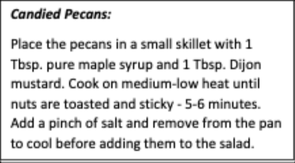
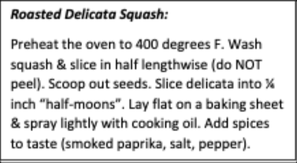

 RSS Feed
RSS Feed